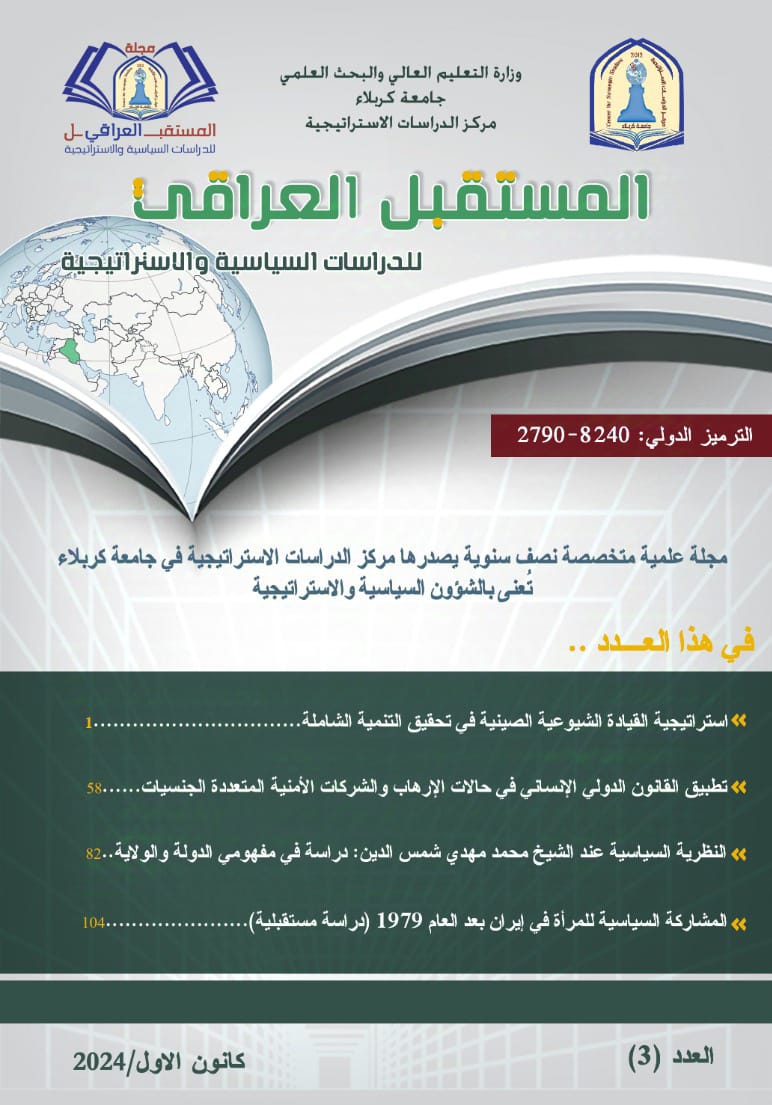Abstract
Abstract
The ideology of the ruling leaders is reflected in the institutional structures. Accordingly, the Chinese state leaders sought to establish the principle of holding everyone accountable and continuous work. The Chinese leader “Mao Zedong” proposed what was called “Maoism” to transform China into a modern nation, and the leaders followed, by reforming institutions, a model that encourages... Expanding quantity in civil society, and giving priority to stability, and in light of the American clinging to capitalism, single – polarity, and globalization that impoverished the people for the benefit of monopolistic companies, so the Chinese leaders worked to develop reforms by integrating into open global markets, and taking measures to secure the entry of foreign goods and investments, and when it began American decline due to unilateralism. China began to take advanced positions globally by presenting ambitious initiatives as an alternative to capitalist globalization based on global participation and solidarity.
The ideology of the ruling leaders is reflected in the institutional structures. Accordingly, the Chinese state leaders sought to establish the principle of holding everyone accountable and continuous work. The Chinese leader “Mao Zedong” proposed what was called “Maoism” to transform China into a modern nation, and the leaders followed, by reforming institutions, a model that encourages... Expanding quantity in civil society, and giving priority to stability, and in light of the American clinging to capitalism, single – polarity, and globalization that impoverished the people for the benefit of monopolistic companies, so the Chinese leaders worked to develop reforms by integrating into open global markets, and taking measures to secure the entry of foreign goods and investments, and when it began American decline due to unilateralism. China began to take advanced positions globally by presenting ambitious initiatives as an alternative to capitalist globalization based on global participation and solidarity.
Keywords
China
Chinese administration
Chinese leaders
economic rise
political development.
Silk Road
Abstract
المُلخص
إنَّ أيديولوجية القيادات الحاكمة تنعكس على البنى المؤسسية، وعليه سعت قيادات الدولة الصينية إلى إرساء مبدأ محاسبة الجميع والعمل المستمر، إذ طرح الزعيم الصيني "ماو تسي تونغ" ما سُمّي بـ"الماوية"، لتحويل الصين إلى أمة عصرية، واتبعت القيادات عبر إصلاح المؤسسات، أنموذجًا يشجع توسع الكمية في المجتمع المدني، وإعطاء الأولوية للاستقرار. وفي ظل التشبث الأميركي بالرأسمالية، والقطبية المنفردة، والعولمة التي أفقرت الشعوب لمصلحة الشركات الاحتكارية، لذلك عملت القيادات الصينية على تطوير الإصلاحات، عن طريق الاندماج في الأسواق العالمية المفتوحة، واتخاذ إجراءات تؤمن دخول البضائع والاستثمارات الأجنبية. وحينما بدأ التراجع الأميركي جراء الأحادية، بدأت الصين تأخذ المراكز المتقدمة عالمياً، عبر تقديم مبادرات طموحة بديلاً عن العولمة الرأسمالية، تقوم على المشاركة والتضامن العالمي.
إنَّ أيديولوجية القيادات الحاكمة تنعكس على البنى المؤسسية، وعليه سعت قيادات الدولة الصينية إلى إرساء مبدأ محاسبة الجميع والعمل المستمر، إذ طرح الزعيم الصيني "ماو تسي تونغ" ما سُمّي بـ"الماوية"، لتحويل الصين إلى أمة عصرية، واتبعت القيادات عبر إصلاح المؤسسات، أنموذجًا يشجع توسع الكمية في المجتمع المدني، وإعطاء الأولوية للاستقرار. وفي ظل التشبث الأميركي بالرأسمالية، والقطبية المنفردة، والعولمة التي أفقرت الشعوب لمصلحة الشركات الاحتكارية، لذلك عملت القيادات الصينية على تطوير الإصلاحات، عن طريق الاندماج في الأسواق العالمية المفتوحة، واتخاذ إجراءات تؤمن دخول البضائع والاستثمارات الأجنبية. وحينما بدأ التراجع الأميركي جراء الأحادية، بدأت الصين تأخذ المراكز المتقدمة عالمياً، عبر تقديم مبادرات طموحة بديلاً عن العولمة الرأسمالية، تقوم على المشاركة والتضامن العالمي.
Keywords
الصين، القيادات الصينية، الإدارة الصينية، الصعود الاقتصادي، طريق الحرير، التنمية السياسية.
